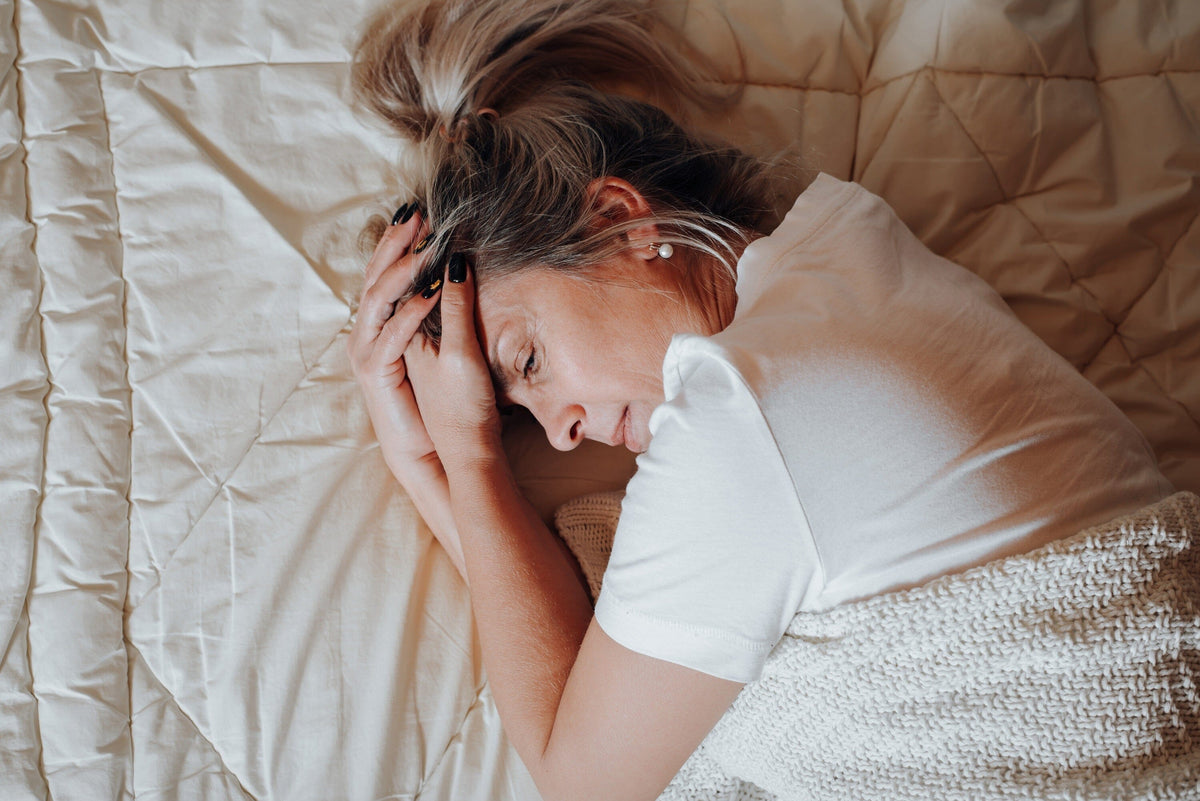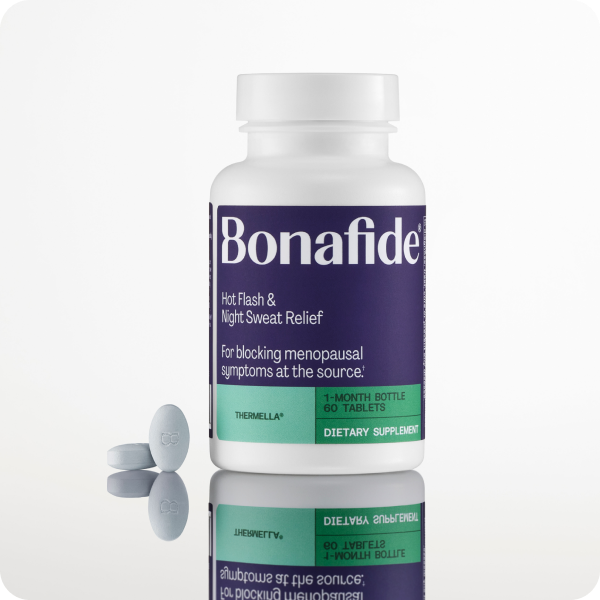You know how you feel when you don’t sleep well. The exhaustion and fatigue caused by sleep deprivation can rob you of your days, as well as your nights. And, unfortunately, poor sleep quality becomes more and more common as women approach menopause.
Data acquired from the 2019 Study of Women’s Health Across the Nation (SWAN) found that sleep disorders in women increase with age:1
- Sleep problems, like insomnia, affect 16% - 42% of premenopausal women (women in their twenties and thirties)
- Around 39% - 47% of perimenopausal women experience insomnia and other sleep-related issues (women in their forties and early fifties)
- Approximately 35% - 60% of postmenopausal women have poor sleep quality which includes fragmented sleep and early morning awakenings
There are many reasons why these sleep issues occur. Luckily, there are also solutions for better sleep that make getting rest during menopause, possible! Read on to find out some of the causes of poor sleep during menopause, as well as what you can do to sleep better at night.
Causes of Poor Sleep Quality During Menopause
During the menopausal transition, there are a myriad of factors that can play a role in sleep disruption. Some of the more common factors include:
Hormonal Changes
Fluctuations in the hormones estrogen and progesterone affect everything from our moods to the way our vascular system works during menopause.
In regard to sleep, estrogen helps to alleviate issues with sleeping by enabling you to fall asleep and stay asleep. It also works to regulate body temperature, which can help to keep you cool while you sleep.2
Progesterone, on the other hand, supports sleep quality by helping to regulate mood and reduce anxiety. When left unaddressed, increased levels of stress or anxiety may contribute to racing thoughts or nightmares, which can potentially keep you from getting a good night’s rest.
These hormonal changes experienced during perimenopause and menopause negatively impact these sleep benefits, resulting in insomnia, fragmented sleep, and other disruptive symptoms.
Menopausal Hot Flashes and Night Sweats
Two of the main causes and symptoms that contribute to poor sleep quality during menopause are hot flashes and drenching night sweats.3 These common symptoms can happen multiple times a night, severely disrupting sleep. The need to get out of bed to change your sheets or bedclothes can further wake you up, making it feel nearly impossible to get a good night’s rest.
Obstructive Sleep Apnea
Declines in estrogen and progesterone during menopause may contribute to the onset of certain sleep disorders, such as sleep apnea.4 This potentially serious condition is earmarked by changes in breathing during sleep.
“Sleep apnea becomes common in women at the age when menopause occurs. This condition causes the airway to collapse, leading to loud snoring and the stoppage of breathing during sleep. This leads to non-restorative sleep and increased daytime somnolence and fatigue,” says sleep expert and rheumatologist Stella Bard, M.D.
Restless Leg Syndrome
In addition to its effect on our ability to fall asleep and stay asleep, fluctuating estrogen levels have also been linked to reduced dopamine secretion, which can result in restless leg syndrome (RLS). RLS is a sleep-disrupting condition that becomes more common as women age.5
“In restless leg syndrome, pain or discomfort in the legs is felt while lying down. You feel the need to move your legs constantly, in order to relieve leg discomfort. Most people with this condition have difficulty falling asleep and staying asleep,” adds Dr. Bard.
Stress and Anxiety
Isn’t it funny how our worries and fears always seem worse at night? Truthfully, there’s nothing funny about it. If you can’t sleep, your mind may wander back to the upsets of the day, exacerbating them, and keeping you awake for longer. Additionally, the changes in mood associated with menopause can worsen this cycle, causing never-ending bouts of insomnia and fragmented sleep.
Mood swings that are caused by the hormonal fluctuations associated with menopause can also often result in depression and heightened anxiety (especially if you were prone to depression or anxiety earlier in life). These emotions can make it difficult to fall asleep and stay asleep.
How Can I Sleep Better During Menopause?
You may be wondering how to sleep better at night. You need around 7-8 hours of quality, uninterrupted sleep each night to feel your best the next day.6 If you’re unable to achieve this, symptoms like exhaustion, fatigue, and brain fog during menopause are all possible results.
For some quick tips on how to improve sleep, check out the below video from Chief Medical Officer, Dr. Alyssa Dweck:
To reduce or eliminate the occurrence of these compounded symptoms from poor sleep during menopause, consider these strategies:
Keep Your Room Cool
If night sweats and hot flashes are keeping you up at night, maintaining temperature control in your bedroom is key. If you have a thermostat, keep it set to 62 degrees or lower if you need to. Keeping your windows open in cold or cool weather can also help to keep disruptive night sweats at bay.
Cool Your Bed Down, Too
Many mattress brands include “hot sleeper” options that come with a cooling layer that works to reduce body temperature. Consider using moisture-wicking sheets and pillowcases as well, that absorb and dissipate sweat without becoming damp if you find that night sweats are leaving you drenched. And while we’re on the topic of moisture wicking sheets, you could also consider switching up your sleepwear. Consider light, breathable fabrics, or those with built-in, moisture-wicking technology if you’re dealing with bad night sweats.
Treat Menopausal Hot Flashes and Night Sweats
If cooling down your sleeping environment isn’t enough to tamp down your hot flashes, consider speaking with your healthcare provider about your treatment options.
Taking an over the counter, hormone-free supplement, that contains ingredients that work to reduce the frequency and intensity of night sweats to improve sleep quality, may be just what you need!
You can also talk to your healthcare provider about prescription medications, like hormone replacement therapy or SSRIs, which have also been shown to help ease symptoms of hot flashes and night sweats. Your provider will help to determine the best treatment option for you based on your needs and specific health history.
Learn more about Thermella®- Bonafide’s hormone-free solution that targets hot flashes and night sweats at the source.*
De-Stress to Put Your Mind at Rest
Relaxing and settling down for sleep can help your body let go of tension, and your brain let go of worry and excess emotion. There are many strategies you can try. They can include meditating before bed, or journaling. Some women find that writing down their to-do list as well as their stressors helps to release them before laying down for the evening. Reading a good book or taking a warm bath before bed can also help. And if scent relaxes you, try an aromatherapy diffuser that contains soothing, scented oils like lavender and chamomile.
Turn off Electronic Devices
Turn off anything with a screen at least two hours before bed. If you must use a computer or phone before laying down for the evening, consider installing blue light screen protectors, or wearing computer glasses with a blue light filter.
Avoid Caffeine and Alcohol
If you’re wondering how to sleep better at night during menopause, consider avoiding caffeinated beverages in the afternoon and evening. These include coffee, tea, colas, and some sports drinks. Not only is caffeine a stimulant, but it’s also a diuretic. Drinking caffeinated beverages late at night can increase the need to urinate during nighttime hours, disrupting your sleep and potentially keeping you awake.
Even though it can make you sleepy, alcohol is actually a stimulant, as well as a depressant.7 Many people who drink alcoholic beverages at night find they go to sleep easily, but wake up in the middle of the night, unable to go back to sleep. Alcohol can also dehydrate you, causing poor-quality sleep.8
Avoid Eating Heavy Meals at Night
Eating heavy foods, fatty food, or spicy food late at night can interfere with digestion, resulting in heartburn, gas pain, and gastrointestinal reflux that can certainly keep you awake.9 Smoking, and drinking carbonated beverages, may also have this effect.
Eliminating heavy meals too close to bedtime, such as those containing red meat and carb-laden side dishes, can support higher-quality sleep.
If heartburn is a problem, try not to eat any type of food for at least three hours prior to bedtime. If digestive issues continue to persist, try elevating your head and upper body with pillows or an inclined mattress. Sleeping on your left, instead of on your right side, may also help.10 Digestive issues that persist should be brought to the attention of your healthcare provider.
Get Enough Exercise
Physical activity and exercise help you release feel-good endorphins, plus they fatigue your body. Exercise has also been shown to improve the quality of slow-wave (deep) sleep, so you may be able to sleep more soundly after exercising.11
Just make sure not to exercise too close to bedtime, as this may have the opposite effect.
When to Reach Out for Help to Get Better Sleep in Menopause
Lack of sleep, and menopausal symptoms like hot flashes and mood changes, can significantly diminish quality of life. If your symptoms are causing you distress, be sure to talk to a healthcare provider about your concerns. Does sleep improve after menopause? It’s possible, although hot flashes last, on average, for 7 years, and they can stick around for even longer, in some instances.12 That’s a long time to wait for relief. Your provider may recommend medications or treatments that can soften this journey and help significantly.
It's also important not to shrug off mood changes such as irritability, depression, and anxiety. Even if they’re “just a part of menopause,” mood swings can be difficult to live with. Talking to a therapist, counselor, or trusted advisor can help you identify next steps that can provide relief. In some instances, these may include short- or long-term therapy.
Resources
- https://pubmed.ncbi.nlm.nih.gov/21961720/
- https://www.ncbi.nlm.nih.gov/pmc/articles/PMC6718648/
- https://www.ncbi.nlm.nih.gov/pmc/articles/PMC6718648/
- https://www.hopkinsmedicine.org/health/wellness-and-prevention/how-does-menopause-affect-my-sleep#
- https://www.ncbi.nlm.nih.gov/pmc/articles/PMC6981604/
- https://www.hopkinsmedicine.org/health/wellness-and-prevention/how-does-menopause-affect-my-sleep#
- https://www.edgewoodhealthnetwork.com/resources/blog/is-alcohol-a-stimulant-or-a-depressant/#
- https://www.sleepfoundation.org/nutrition/hydration-and-sleep
- https://www.sleepfoundation.org/physical-health/sleep-and-overeating#
- https://jamanetwork.com/journals/jamainternalmedicine/fullarticle/410292
- https://www.hopkinsmedicine.org/health/wellness-and-prevention/exercising-for-better-sleep
- https://www.mayoclinic.org/diseases-conditions/hot-flashes/symptoms-causes/syc-20352790#









